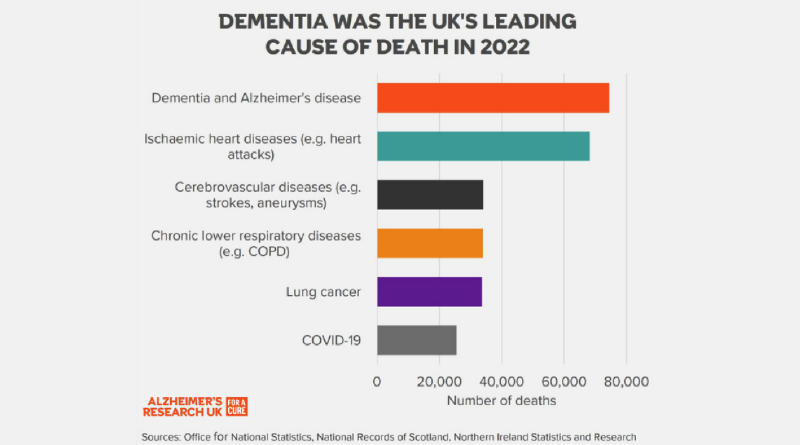Dementia Is “The UK’s Biggest Killer” Research Reveals
New analysis from Alzheimer’s Research UK, has confirmed that dementia continues to be the UK’s leading cause of death, accounting for more than one in ten of all deaths across the country. In total, dementia claimed more than 74,000 lives.
Amzheimers Research pulled together the latest data from the three agencies that track official causes of death across the country – the Office for National Statistics (which covers England and Wales), the National Records of Scotland and the Northern Ireland Statistics and Research Agency – to uncover the full scale of dementia’s impact across the UK.
It’s long been clear that dementia affects women more than men, it has been the leading cause of death in women in the UK since 2011, with women continuing to be at greater risk last year, with 48,000 dying from the condition compared with over 26,000 men.
Among the devolved nations, Northern Ireland had the highest dementia death rate at 11.8%, compared with 11.4% in England and Wales, and 10% in Scotland.
Commenting on the study Shelle Luscombe who lost both her parents to dementia said: “Seeing the impact dementia had on my dad and then my mum was devastating. It’s a cruel condition and, as things stand, anyone diagnosed faces a very bleak and terrifying one-way street, which wreaks havoc on the whole family,” she told us.
“This new analysis from Alzheimer’s Research UK is a massive wake-up call. We need action now if we’re to stand a chance of changing the outcome for the next generation and beyond”.
Alzheimer’s Research UK says that recent research breakthroughs in treatment and diagnosis are finally bringing hope that one day a cure can be found. But sustaining this momentum needs greater ambition from the current and future governments to reach a future free from dementia. The charity has set out a series of recommendations in its report, Tipping Point: The Future of Dementia, which outlines the actions needed to transform the way dementia is prevented, diagnosed, and treated, and to ultimately find a cure.
Recommendations in the report include to:
- Create a cross-governmental ‘Strategy for the Prevention of Ill Health’ to address the health and lifestyle factors that affect our risk of developing dementia. For example, exposure to air pollution, and unmanaged hearing loss.
- Commit to investing £16m in diagnostic infrastructure, equipment, and workforce training, including 50 new band 6/7 nurses across the UK. This should be followed by sustained annual investment of £10m until new diagnostic tools, like blood tests, are ready to replace existing methods like lumbar punctures.
- Instruct the National Institute for Health and Care Excellence (NICE) to consider the cost of informal care and carer’s quality of life, when assessing the cost-effectiveness of new dementia treatments for the NHS.
- Establish the UK as a world leader in dementia research by capitalising on initiatives such as the Dame Barbara Windsor Dementia Mission and increase research opportunities for people to participate.
Hilary Evans, Chief Executive of Alzheimer’s Research UK said, ‘This new data paints a stark picture of the scale and impact of dementia across the UK, and unfortunately, it’s not surprising. We fear these figures are likely an underestimate because many people with dementia don’t even receive a formal diagnosis. Data on who gets diagnosed and where is frustratingly incomplete, and this makes dementia a huge blind spot for healthcare decision-makers and politicians.’
Evans added, ‘Dementia is the biggest health crisis of our time, casting a dark shadow over the near million people affected by the condition in the UK. Not only does it bring fear, heartbreak, and harm to the ones we love, but it’s also having a huge impact on our economy.’
Currently, dementia costs the UK £25bn annually, with loved ones providing over one billion hours of unpaid care to those living with dementia.
Visit the Alzheimer’s Research UK website to download the report in full.






